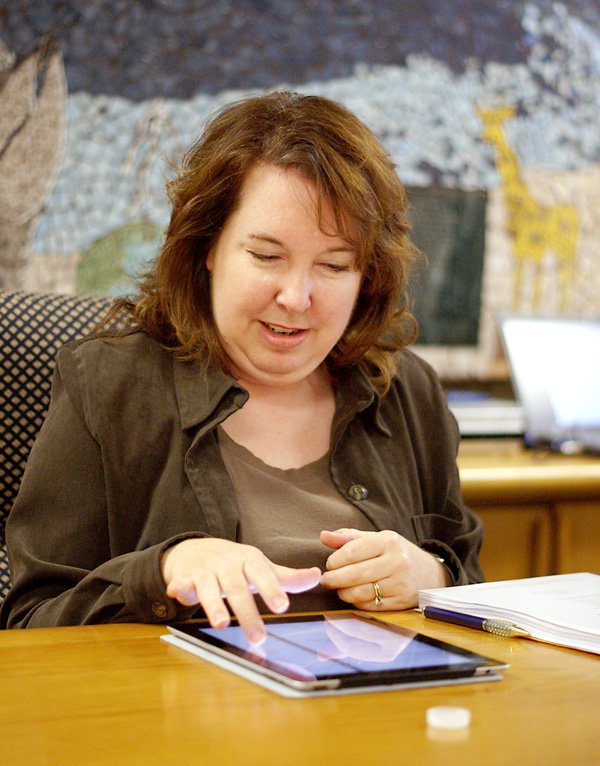GENTRY — School board members got their first look at going paperless during Monday night’s board meeting, viewing meeting agendas and the full 232-page board packet in a digital format on iPads used by school administrative staff and on a large flat-screen monitor on the board-room wall.
Though board packets were still printed for Monday’s meeting, board members were also sent the packets in digital format last week, using Dropbox, a free service which allows those with accounts to upload files to a drop box and access those files from other computers or share them with others.
Board members were asked to create accounts for the service so that they could accessthe school board files from their home computers or from laptops, iPads or iPhones.
The board was considering the cost effectiveness of purchasing iPads for board members to use so that they would have access to all the information in board packets at the meetings without the printing costs.
Randy Barrett, Gentry Schools superintendent, told board members that he had calculated the cost of printing the packets at approximately $4.21 per monthly book. His cost estimate included paper, binder, cover, printing costs, mailing envelopes and labels and the time paid to his assistant for printing, assembling and mailing the packets.
With 14 packets prepared each month of approximately 232 printed pages each (or 116 pages printed front and back), he estimated the cost at $706.71 per year to print the packets. He said the district could buy iPads for $499 each and that it would take five years of going paperless to pay the cost of purchasing iPads for the board members to use.
His estimates, he said, did not include environmental costs and concerns.
When Barrett asked board members how long they retained hard copies of packets, none said they kept them for longer than three months.
Another option, Barrettsaid, was to use Dropbox to send out packets and let board members open and read them on their own computers. Instead of purchasing iPads so board members could view items during meetings, portions of the packet could be viewed on the large flatscreen monitor.
Should the board elect to go paperless, the move is in line with the current transition of schools to electronic text books, materials and testing in the schools.
In other business, the board approved a bid of $11,282 from All AV Services, Inc., in Springdale, for wireless microphones and audio equipment to complete the high school auditorium. Though the bid was slightly higherthan the lowest bid - only by about $100 - for the project, the All AV package was the only one to include setup, synchronizing with the school’s sound equipment and training.
The board approved adding the purchase of security cameras to the district’s 3-year technology plan.
“You could add security cameras to the plan in case you want to install them in the future,” said federal curriculum coordinator Judy Winslett. “That does not mean you have to do it,” she said.
The school board had discussed installing security cameras at the high school before but did not do so because of the cost involved - approximately $50,000.
The technology plan is a projection of technology needs of the school district which is prepared every three years.
Winslett told board members that all district campuses were up and running with wireless network technology.
The board adopted on its final reading a policy change regarding the use of personal electronic devices at the school.
The policy change, effective next school year, would allow students to bring their personal electronic devices - items such as smart phones, iPads and e-readers - to use in facilitating instruction. The proposed policy includes strict guidelines on the use of personal electronic devices, such as muting ringtones and sounds, making their use in the schools and classrooms subject to principals' and teachers' guidelines and setting specific rules and guidelines for electronic communications and social networking.
Barrett told board members the school district was in sound financial shape, with a $3.4 million balance in the district’s operating fund. He said the district was on target to finish the school year with a $1.5 million balance - an ending balance goal set by the board to avoid a declining balance and the possibility of state intervention.
The board considered in executive session the performance of Barrett as superintendent and voted 7-0 to renew his contract for another year.
News, Pages 1 on 01/18/2012

